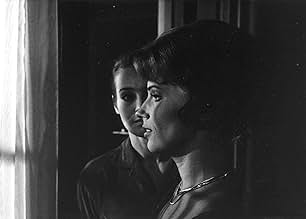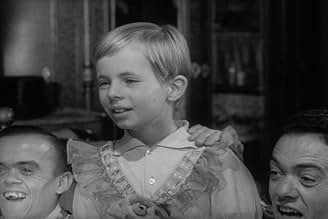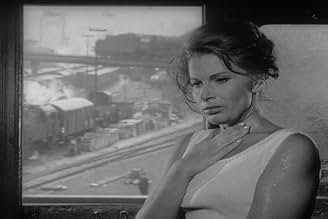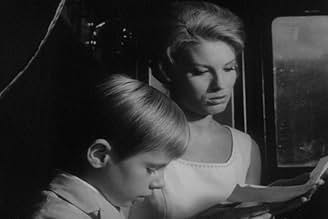Duas irmãs afastadas, Ester e Anna, e o filho de 10 anos de Anna viajam para a Europa Central à beira da guerra. Ester fica gravemente doente e os três se mudam para um hotel em uma pequena ... Ler tudoDuas irmãs afastadas, Ester e Anna, e o filho de 10 anos de Anna viajam para a Europa Central à beira da guerra. Ester fica gravemente doente e os três se mudam para um hotel em uma pequena cidade chamada Timoka.Duas irmãs afastadas, Ester e Anna, e o filho de 10 anos de Anna viajam para a Europa Central à beira da guerra. Ester fica gravemente doente e os três se mudam para um hotel em uma pequena cidade chamada Timoka.
- Prêmios
- 3 vitórias e 2 indicações no total
- Woman in Variety Hall
- (não creditado)
- The Paperboy
- (não creditado)
- Man in Variety Hall
- (não creditado)
- Impressario
- (não creditado)
- The Bar Owner
- (não creditado)
- The Doorkeeper
- (não creditado)
- Anna
- (não creditado)
- The Cashier
- (não creditado)
- The Old Man
- (não creditado)
Avaliações em destaque
The film also has one or two monumental pieces of cinematography - not least the scenes with the small boy in the large lobby of the hotel - far more effective in this film than in the "tribute use" by Kubrick in the Shining many years later. The shots of tanks rolling through the unnamed Southern European town will stick in my mind for a long time.
Ingrid Thulin and Gunnel Lindblom were two of Bergman's best women and he works with them to terrific effect in this movie.
This is one of the great movies - highly recommended.
Like the title suggests, it's almost a silent film, and at times a quiet film, but thought provoking
It is, personally, my least favorite in the 'trilogy' of Bergman's (the previous two being the masterpiece Through a Glass Darkly, and the strong Winter Light), but it is a very frank film, and like the best of the theater, Bergman knows that not letting the audience know everything is a bonus, especially when dealing with complexities and up-front issues in this film. For its time it was very controversial due to the sexual nature of the film (it's uncut on the criterion DVD, and it is of note that Bergman is dealing with the carnal side- nudity, loveless passions, suggestions of incest), yet it is mostly an honest portrayal of this.
Ingrid Thulin (Ester) and Gunnel Lindblom (Anna) star as sisters (at least I think they're sisters, by description of the plot, sometimes that too is left unclear) who start off in a train, along with Lindblom's son Johan, played by Jorgen Lindstrom (later to appear in the opening scenes of Persona). Each character is very sharply defined, which carries through the rest of the film- Ester is sick, and lonely, who works part-time as a translator, but mostly acts repressed, sad, and rather disgusted by the actions of her sister Anna (though mostly in a subtle way that gets to her). Anna, meanwhile, is the mother of Johan, who loves her son but usually can't stand to be around the hot, claustrophobic hotel room. She goes out into the jazz music scored city cafés, having strange and explicit encounters (one of the more shocking and effective scenes is inside a theater, where as dwarfs act on the stage, to Anna's right a couple has animistic sex).
She, too, tries to satisfy her emptiness this way, leading to a difficult, harsh climax. The two actresses play their parts, whether it sometimes becomes a little tiresome (in the brooding, Antonioni sense I mean) due to Bergamn's direction, as strong as they can play it. Thulin is, even when she has her Cries & Whispers type scenes, at her best in the film, showing her skills at being calm, inward, and psychologically nuts. Another reviewer commented on the Freudian elements in the film, the obsessions of women, or the repression with it. There is a sharp contrast then with Thulin's thoughtful, hurting performance, and Lindblom's passionate, lusting, and ultimately desperate performance. Each character is only looking for love, and since they can't find it with each other, they can't seem to find it with others outside of the Hotel walls.
Stuck in the middle of them is Johan, who is played by Lindstrom with total innocence, if at times disillusionment. Bergman directs him and writes what he does and observes perfectly- kids usually find things to do even in the most lonely of situations, and there's some fun (if very surreal in the Bergman cannon) in an encounter he has with the dwarfs. But with Johan as well, amid the vast corridors, there is little for him to do. Early on when they get to the hotel, there is a somewhat disturbing little moment where Anna asks for him to wash her back. He does for a few seconds, but stops. She understands in some way, and the two spend a moments of close silence. Being a ten year old without any real connections (he comments to Ester at one point about her not being around) creates a sense of detachment, which pervades almost every scene of the film.
And it is this detachment that I found a little troubling about the film (and not quite in a good way). The themes of the Silence, and its execution, is a little hard to take on the first viewing, and one wonders if it would be more enlightening, depressing, or even worth it for a second viewing. It's not that the Silence is a lessor Bergman work, far from it, but the experimentation that he goes through with the characters is hard to connect with- it's the least of the 'trilogy' that deals with God (at least on the surface like a Seventh Seal), but due to its limited dialog, he relies heavily on symbolism and the straight images of people in emotional desolation, not always workable or connecting.
Still, there is one side to this experimentation that I found to work best- the work with legendary Sven Nyvist. It is an enclosed space, but there is much that is covered in technical terms, and in terms of just the camera-work it is one of Bergman's more inventive and deep touches. The deep focus/long shots in the corridors; the close-ups of Ingrid Thulin's face (upside down in a few scenes, highly effective); the images that race across Johan's eyes, like on the train (the fake tanks), the baroqueness of the butler; the sex scenes in a beautiful mix of truth and illusion.
The Silence demands to have some thought put to it, or at least some emotion, even as it takes its deliberate time: a little empty, but also fulfilling, and in the end asks more personal questions that can't be answered, much like how the other films in the trilogy did with the subject matter.
The first is the theological/existential perspective. Contrary to many published reviews on the trilogy, I find the three films affirm the existence of God in the face of doubt. What is the silence referring to? God appears to be quiet; yet the ailing Ester communicates with her nephew by providing him a piece of paper with a foreign word "hadjek" that means "soul" or "spirit". Is that a word that a woman disillusioned with existence of God would pass on to her nephew on her deathbed? I have doubts about Bergman's professed agnosticism. "Hadjek" is the last word of The Silence spoken by Johan reading from the list of foreign words from Ester's letter to him that he jealously guards from his own mother Anna. Somewhat like "rosebud" in Citizen Kane. Again there are two shots towards the end of The Silence that offer Christian symbolism affirming faith in God. First, there is the last shot of Ester her face directed at light from the window, fully exposed to light, as she waits for her eventual death, content at having passed on the letter to her nephew. The second is the last shot of Anna her bathing her face in rainwater (a symbol of baptism) having read the contents of the letter that Johan holds in his hands.
Now Bergman gave names to his film's characters with considerable thought, incorporating Biblical connections that he probably picked up from his father's sermons. The priest Tomas in Winter Light is so named because St Thomas doubted the resurrection of Christ, just as Tomas is questioning the existence of God. Ester in The Silence is obviously named after the Biblical book Esther, one of the only two books in the Bible that does not mention God directly. Does the absence of God mean the book is not holy? By corollary, does the silence of God mean that God does not exist? For the atheist viewer of The Silence, too, there is sufficient room to record the director's observation of deserted churcheswhen Anna truthfully confesses to her elder sister that she had sex with a waiter in an empty church. For the existentialist viewer, there is silence from God to the cries of help from Ester. Yet another way to appreciate The Silence is to study the physical silence in the film. Spoken words are indeed few. The film begins with the tick-tock of a watch/clock, which stops when the characters break their silence. The watch is also a metaphor for the limited time of life on earth available for each individual. The sound of the tick-tock increases when Ester is unable to breath and is mortally afraid of dying from suffocation. It is also heard when Anna is reflecting on her post-coital satisfaction in her hotel room. Words are fewthe foreign words learnt in the unnamed country relate to "hand", "face" and finally "soul". Much of the visual communication relates to "hands" and "faces", particularly those of Ester. Ester's hands move even when she is sleeping. Ester's hand caresses Anna's hair but stops short of touching the face. The denizens of the unnamed country hardly speak, yet we know all is not well, with tanks moving in the night and underfed horses pulling carts of furniture to nowhere. Death seems around the corner. One of the few other sounds we hear is the click of the toy gun, disturbing the cleaner of the chandelier. Then there is the clank of the tank negotiating the narrow street outside the hotel. More importantly, silence in the film between individual characters in the film, existing side by side with the theological silence.
A third way to evaluate complex issues of The Silence is to study the camera-work of Sven Nykvist. Much of the brilliance of the black-and-white film revolves around shadows and light, mirrors and last but not the least, close-ups. The carnal events are captured in shadows, while epiphanies are swathed in bright light. Nykvist and Bergman use mirrors to indicate the lack of direct communication or rather the presence of bounced communication. When Ester, the translator of languages cannot converse with the maitre d'hotel, she resorts to sign languageeven the boy Johan prefers Punch and Judy to communicate his feelings rather than read a book for his sick aunt. The extraordinary performance of one of cinema's finest actresses, Ingrid Thulin, would have been difficult to perceive were it not for Nykvist's close-ups of her face and hands.
A fourth way to approach The Silence is the character of the young boy Johan, who probably is the personification of the young Bergman. Johan is a mix of irreverence (he urinates in the hotel corridor) and innocence (he willingly cross-dresses at the behest of the dwarfs). He is attached to his mother, but respects his aunt even more. As the film un-spools, it is evident that he obeys his mother but is able to connect with the aunt's higher level of intellect, quite aware that she is dying. Johan's father exists but is not physically present. Johan is figuratively squeezed between his mother lacking a "conscience" and an aunt with a domineering and an implied lesbian relationship with his own mother. It is not a perfect life for a boy. Indirectly, Bergman wants the viewer to step into Johan's shoes, irreverent yet innocent and loving. Johan is first introduced to death by the personal collection of family photographs of the maitre d'hotel, including photographs of his dead wife. But John prefers to hide them beneath the carpet but resurrects the subject in his own Punch and Judy show for his aunt.
Then you can look at The Silence as the quintessential Ingrid Thulin film. In The Silence her facial expressions are the very imprints one associates with Peter O'Toole's thespian turns in cinema. It is no wonder that she acted in films of topnotch directors: Bergman, Visconti, Resnais and Minnelli.
It's a study in contrasts. It's about the strife sewn into the lining of family intimacy, contrasted with the perfection of strangers engaged in the base behaviors. Complexity vs. Simplicity. The common ground shared by youthful innocence and ignorance vs. the confusion imposed by years of living. Short people seeking acceptance vs. normal folk who are so completely unacceptable to each other. It's about a dying woman whose life's work is translating one language to another so others can understand it vs. two people who speak the same language who cannot understand each other (further) vs. two other people who speak different languages who have a better understanding than those sharing a common lexicon. And on and on.
Watching this film, it occurred to me how deeply Bergman's work influenced the likes of Kubrick and Hitchcock and Aldrich and Leigh so many more. 2001 Space Odyssey, Psycho, so many of the great films have seeds here. The screen was Bergman's canvas; the camera his brush. Neither the script nor the imagery alone created the work. His work has a soul from the combination of all of it.
Watch Bergman's life's work and save yourself a bundle on film school. You'll be in the master's care.
Bergman's women shine in this film, too, although they must have been exhausted afterwards. Ingrid Thulin and Gunnel Lindblom star as the two sisters, whose apparent incestuous relationship has destroyed them both, Esther (Thulin) physically (she is dying) and Anna (Lindblom) mentally. They arrive, with Anna's son Johan, in a foreign city at war, which creates an uncozy atmosphere around Sven Nykvist's exterior shots. The tanks roll down the city streets, becoming a metaphor of the war of emotions between Anna and Esther. Thulin makes a very physically demanding performance, like Harriet Andersson in "Cries and Whispers" she is dying (of cancer?), and her pain is showing. Anna clearly wants to hurt her sister, who is the oldest and smartest of them, by saying cruel things and playing with Esther's apparent sexual love for her.
Sigmund Freud would have loved this film, and Anna seems to want to break free from her sister by having casual sex with a man she meets at a bar. She then tells her sister about it, and Esther's reactions to this is extremely ambiguous, like most of the film is. Anna's wish to become free of her sister is deeply rooted in childhood experiences, and it leads Anna to say things like "I wish she was dead" to the man who does not understand a word she is saying. All these things make "Tystnaden" the disturbing film it is. The only release is when Johan explores the corridors of the hotel alone, meeting a bunch of short men who perform at a circus-like variete Anna visits to escape from the sight of Esther. But Johan meets a kind (or is he a paedophiliac?) old man who works at the hotel, and it is he who has to care for Esther as she draws her last breaths, Anna tearing Johan away from her sister's arm in a very cruel manner. The long periods of silence in the film perhaps makes the title, or perhaps it means that the silence about the sisters' past is never broken to us, the spectators. A lot is left up to us to interpret, typically of Bergman's cinema.
All in all, a very ambivalent, Freudian and disturbing film from one of the masters of the cinema.
Você sabia?
- CuriosidadesThe language in the movie is Gun Grut Bergman's creation. She was a translator and linguist in Slavic languages. The name of the city, which is indicated first in the train's speaker, and then by Anna, as Timoka, is a real word however. Bergman found it in a book in Estonian on the bookshelf of his wife Käbi Laretei. When he asked what it meant, she replied "belonging to the hangman".
- Citações
Ester: I didn't want to accept my wretched role. But now it's too damn lonely. We try out attitudes and find them all worthless. The forces are all too strong. I mean the forces... the horrible forces. You need to watch your step among all the ghosts and memories.
Ester: All this talk... There's no need to discuss loneliness. It's a waste of time.
- Versões alternativasThe original UK cinema release featured the pre-edited US print which was then cut by a further 35 secs by the BBFC to shorten some shots of Ester stroking Anna's hair and to replace subtitled references to erections and semen. The 1999 Tartan video is the complete version.
- ConexõesEdited into Journal d un père (2023)
- Trilhas sonorasGoldberg Variations, BWV 988 - Variatio 25
Music by Johann Sebastian Bach
Principais escolhas
- How long is The Silence?Fornecido pela Alexa
Detalhes
- Data de lançamento
- País de origem
- Idiomas
- Também conhecido como
- El silencio
- Locações de filme
- Empresa de produção
- Consulte mais créditos da empresa na IMDbPro
Bilheteria
- Faturamento bruto mundial
- US$ 14.199
- Tempo de duração1 hora 36 minutos
- Cor
- Proporção
- 1.37 : 1



























